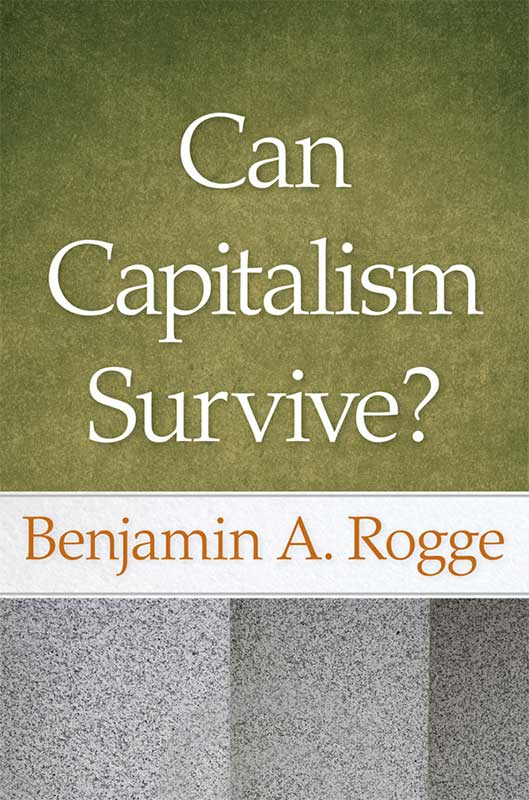Can Capitalism Survive?
By Benjamin A. Rogge
One of the signs of advancing age in the American college professor is a tendency for him to write less and publish more. This seeming paradox is easily explained by the phenomenon of
Collected Works, that is, by what on television would be described as reruns. As in television, no great public outcry is needed to bring forth the reruns; a question from his wife, a polite suggestion from a colleague, and the cut-and-paste operation is under way.I have put together here what I believe to be the best of the rather meager output of my professional career up to this point. For reasons (mostly financial) that always seemed adequate at the moment, I have been more of a speechmaker than a writer. Thus, you will find that many of the pieces in this collection are but speeches put down on paper…. [From the Foreword]
First Pub. Date
1979
Publisher
Indianapolis, IN: Liberty Fund, Inc. Liberty Fund, Inc.
Pub. Date
1979
Comments
Collected essays.
Copyright
The text of this edition is under copyright. Picture of Benjamin Rogge: file photo, courtesy of Liberty Fund, Inc.
- Foreword
- Part I, Introduction
- Part I, Chapter 1, Can Capitalism Survive
- Part II, Introduction
- Part II, Chapter 1, The Case for Economic Freedom
- Part II, Chapter 2, The Libertarian Philosophy
- Part II, Chapter 3, Who is to Blame
- Part II, Chapter 4, Paradise in Posey County
- Part III, Introduction
- Part III, Chapter 1, Adam Smith, 1776-1976
- Part III, Chapter 2, Christian Economics: Myth or Reality
- Part III, Chapter 3, College Economics: Is It Subversive of Capitalism
- Part IV, Introduction
- Part IV, Chapter 1, Profits
- Part IV, Chapter 2, The Businessman
- Part V, Introduction
- Part V, Chapter 1, The Labor Monopoly
- Part VI, Introduction
- Part VI, Chapter 1, The Long-Run Economic Outlook
- Part VI, Chapter 2, Alleged Causes of Inflation, Corporate Monopolies
- Part VII, Introduction
- Part VII, Chapter 1, The Problems of Cities
- Part VIII, Introduction
- Part VIII, Chapter 1, Financing Higher Education in the United States
- Part VIII, Chapter 2, The Promise of the College
- Part IX, Introduction
- Part IX, Chapter 1, The Businessman and the Defense of Capitalism
- Part IX, Chapter 2, Reflections on the Election of 1964
- Part IX, Chapter 3, The Foundation for Economic Education, Success or Failure
Part VIII, Introduction
Part VIII
ON EDUCATION
I served as academic dean of Wabash College from 1956 through August 1964. The college somehow survived the pervasive aura of disorganization that marks my administrative style and, in the meantime, I came under the necessity of doing some concentrated thinking on various issues in higher education. The two papers in this section are samples drawn from that thinking.
The first paper (“Financing Higher Education”) was prepared for a meeting of the Mont Pelerin Society in Switzerland in 1957. A year or two later it was shortened and published in the
Wall Street Journal. The response of my colleagues on campuses around the country was, shall we say, heated.
The second (“The Promise of the College”) was given most recently in 1972 as a commencement address at Park-Tudor, a private school in Indianapolis.
The Wealth of Nations (New York: Modern Library, 1937), pp. 717-18.
ACLS Newsletter, Winter 1956-57, p. 12.
A New Basis of Support for Higher Education (New York: Bureau of Publications, Teachers College, Columbia University, 1957), p. 7.
Part IX

